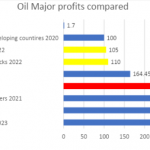New Zealand’s best kept secret
Lots of tourist places here in NZ like to boast that they are the country’s best kept secret. Unfortunately NZ’s best kept secret is not a charming seaside wine bar or prime surfing location, it is the truth behind the country’s Clean, Green international brand. It’s a dirty truth: coal mines on conservation land, fracking, deep sea oil drilling, heavily industrialised farming, and polluted rivers and lakes.
NZ’s 100% Pure international image is hugely important for the country. Tourism and dairy are the NZ’s economies largest exports and they both rely heavily on this perceived brand. Luckily for the government, the tourists aren’t coming home telling tales of the permits of deep sea oil drilling in waters far deeper than where the Deepwater Horizon disaster occurred or the continued attempts by the government to open up conservation land to open cast coal mines. They see the pristine beaches and gorgeous coastlines they are supposed to. Little by little however, the truth is starting to leak out: NZ’s conservative National party is as addicted to the fossil fuel agenda as the rest of neo-liberal Kool-Aid drinkers.
With little chance of the National party losing the election this coming November, Kiwis are fighting to stop the reckless destruction of some of NZ’s most beautiful coastline and conservation areas. Prime Minister John Key’s idea of running the country has been to enthusiastically hawk opportunities for deep sea oil to international investors, promising billions of barrels of oil and granting permits for the Great South Basin, West Coast Basin, Offshore Taranaki and the Rakumara Basin in addition to offering up a Northland block around Cape Reinga. For the Maori, Cape Reinga is place of spirituality and legend; the jumping off point for spirits of the dead into the next life. The prospect of a Deepwater Horizon spill in these waters is quite understandably horrifying.
NZ’s increasingly industrialised dairy industry is responsible for roughly half of the country’s greenhouse gas emissions. Attempts to bring agricultural emissions under the Emissions Trading Scheme have met with fierce resistance not only from Fonterra, NZ’s largest dairy company owned by 95% of the country’s farmers, but also from the government. In addition to pushing an increasingly industrialised farming model Fonterra relies on imported palm kernel animal feed from processing plants in Indonesia that are contributing to massive deforestation in ancient forests. Greenpeace NZ calculates that the amount of palm kernel feed imported by Fonterra in 2008 had a carbon footprint of over 20 million tonnes. Fonterra is also one of the largest coal users in the country burning over 400,000 tonnes at its dairy processing factories.
Mining for coal, the dirtiest fossil fuel, is not being phased out as scientific experts say is needed to have any hope of preventing a 2 degree temperature rise, it is running full steam ahead. One example is the Escarpment coal mine on the Denniston plateau, an area located on public conservation land. Solid Energy, a coal focussed, state owned energy company, currently has plans to dig up lignite (the lowest ranking of the already dirtiest fossil fuel) and create a lignite to briquette processing plant. The Green party in NZ says the plan would increase NZ’s carbon emissions by 10 million tonnes a year. And last but certainly not least fracking has been added to the fossil fuel cocktail here in NZ. Among other concerns such as water pollution, fracking has been linked to earthquakes and companies here are operating along known fault lines within the Taranaki area. In the shaky isles, a country that has recently been through devastating earthquakes is there any other proof needed that the NZ government should share the title of fossil fools?
While fossil fuel advocates label their opponents economic saboteurs, the reality is that NZ has several advantages that could make it a world leader in renewable energy creating new jobs and boosting the economy. In fact 74% of the country’s electricity already comes from renewable energy. But as is too often the case, it is lack of political will that is holding back the country from truly living up to its Clean and Green image. In NZ as with most of the rest of the world it will require public pressure, and lots of it, to create a country that truly deserves the description ‘100% Pure’.




I hear so many good things about NZ that I never realized how dependent they are on fossil fuels… I still hope to be able to visit someday.
Yes, and I heard recently that hunting is completely uncontrolled and the kiwi itself is extremely endangered partly for this reason. I can’t now remember if it was a direct or indirect effect of the hunting – I presume indirect – surely they don’t actually go out and kill their national symbol! Does anyone else know about this? I think it may be something to do with dysfunctional wild pig hunting, which like so many other hunting practices – actually increases the numbers of the hunted species – in this case a highly destructive non native creature.